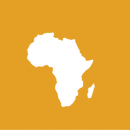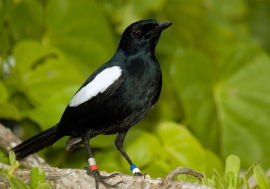African plan advances, says UN
African plan advances, says UN
African countries are making considerable progress in carrying out their continental plan, the New Partnership for Africa's Development (NEPAD), UN Secretary-General Kofi Annan says. Yet to help them surmount the serious challenges they continue to face, he argues in his second annual report on NEPAD's implementation,* Africans also require firmer and more coherent support from the international community. This should entail more aid, debt relief, foreign investment and trade opportunities. It also should involve greater consistency in external policies, so that advances on one front are not undercut by lags on another.
"Africa is putting its shoulder to the wheel," explains Under-Secretary-General Ibrahim Gambari, the UN's Special Adviser on Africa. "Since NEPAD's adoption in 2001, it has accomplished a lot."
The Secretary-General's report notes "much progress" on the African Peer Review Mechanism, a voluntary process by which African leaders subject their standards of democracy, human rights, governance and economic management to review by other Africans. So far, 23 countries--nearly half of Africa's total--have joined, and several more are considering joining. Between May and July 2004, the mechanism's first support missions travelled to Ghana, Rwanda, Mauritius and Kenya to prepare for their reviews.
| 1990 | 1995 | 2000 | 2001 |
2002 |
|
| Net aid inflows * | 25.6 | 22.0 | 15.8 | 16.6 |
22.2 |
| Debt servicing outflows ** | 23.0 | 22.2 | 22.1 | 21.4 | 21.9 |
|
* Official development assistance. ** Includes servicing payments on long-term public and private debt. Source: UN Africa Renewal based on data in: "New Partnership for Africa's Development: second consolidated report on progress in implementation and international support," report of the UN Secretary-General, 4 August 2004. |
|||||
To develop Africa's physical infrastructure, reports Mr. Annan, NEPAD's heads of state implementation committee has approved a list of 20 "top priority" projects, including in energy, transport, water and sanitation, and information and communications technologies. Although the World Bank and African Development Bank have already earmarked some financing, about half of the estimated total cost of $8.1 bn is expected to come from the private sector.
Coherence in policies
Despite Africa's progress so far, points out Mr. Gambari, "there's a lot left to do. And for that, Africa's needs its external partners to be even more forthcoming." The international community is already giving more, he acknowledges, and Africans welcome that support. "But sometimes the partners give with one hand and take away with the other."
While the international community is now beginning to provide more support to Africa, the report emphasizes, that assistance is sometimes not well-coordinated, limiting its effectiveness. Moreover, international policies and practices on aid, debt, trade and investment often are inconsistent, with shortcomings in one area undermining progress in another.
The Secretary-General's report, for example, notes that the overall level of aid to Africa has increased during the past couple years. According to donor country figures, total official development assistance to the region reached $22.2 bn in 2002 (up from just $16.4 bn in 2000). Preliminary UN estimates project that it may have reached $23.1 bn in 2003.
Yet this is still below the $25.6 bn in aid Africa received in 1990. And most of the financing won through aid inflows continues to be lost through high debt-servicing payments. In 2002 alone, Africa paid $21.9 bn in external debt-servicing costs, almost the same amount it received in aid that year.
So far, 23 African countries have received some debt relief under the Heavily Indebted Poor Countries (HIPC) initiative. However, even for the 11 African countries that have reached the HIPC stage at which they are eligible for extensive debt cancellation, observes the Secretary-General, there is not much hope for "debt sustainability." As a result, "there is now an increasing call for a new framework for debt sustainability" that goes beyond HIPC.
Donor aid policies and international trade practices are also contradictory, the report emphasizes. Africa's share of the world market has declined dramatically since 1970, reports the Secretary-General, bringing estimated losses of income of about $70 bn a year--almost five times what Africa receives in aid annually. The continent especially needs reforms in agricultural trade, he says, including elimination of agricultural subsidies in developed countries, which place Africa's agricultural exports at a competitive disadvantage.
The Secretary-General urges Africa's partners to better align their policies in these different areas. "Improved policy coherence," he says, "promises to be a virtuous link in the cycle of increased and effective aid, reformed trade policies and debt relief by developed countries towards Africa."
African action
About half of the Secretary-General's report looks at the actions that Africans themselves have undertaken over the past year. African countries, reports Mr. Annan, are seeking to gradually align their budgetary spending with NEPAD priorities. They have committed themselves, for example, to allocate 15 per cent of their national budgets to health and 10 per cent to agriculture. About 5 per cent of both national and local budgets should be earmarked for water and sanitation, while spending on science and technology should rise to 1 per cent of gross domestic product within five years.
This process is likely to be slow, says the report, since most African countries face severe fiscal constraints and are bound by budgetary agreements negotiated with external financing institutions. In addition, the share of external aid devoted to agriculture in Africa has been declining, while the health sector is losing professionals both to emigration and to the ravages of the HIV/AIDS pandemic.
There have been advances in promoting women's involvement in NEPAD implementation, the report notes. Out of the seven members of the African Peer Review Mechanism's panel of eminent personalities, three are women, one of whom is the panel's chair. Several women hold high-ranking positions representing their governments on the NEPAD steering committee and several also hold senior positions in the NEPAD Secretariat.
As the implementation of NEPAD moves forward, the Secretary-General concludes, a "strengthened partnership" is needed. Within that partnership, African countries would "deepen their commitments" to NEPAD, while the continent's development partners should take a series of "carefully targeted" measures to give a major impetus to the African plan.
* [ Full text: Report of the Secretary-General PDF version (112k) ]
















